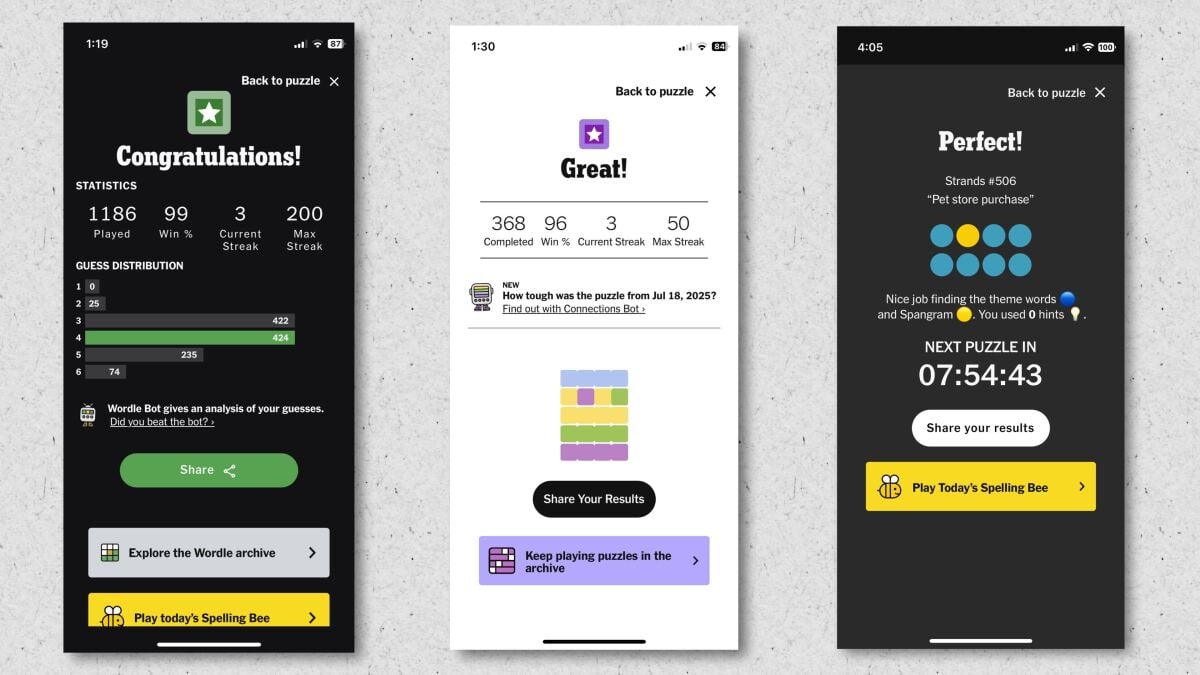Once you started playing New York Times’ quick little word games, it is easy to stop playing others. (Heck, I subscribed their application first Crosswords.) But you currently play games and doubt others. So let’s break it: What should each of these three popular games need to be offered, and what is taking to be good for each?
Door
In it DoorYou guess you One Word, don’t give you anything at the beginning. You need to bring your own starter word: I get up Everyone has their favorites. Green and yellow squares lead you after each. Green but you say a letter in the right place; The yellow letters are in the term, but you have a place.
Time commitment: At least. In most days I take less than one minute, but a strategic word (or someww bad essions) means you stare a few minutes. Sometimes I put my phone and return to it later.
Skills are required: This game thinking about how the words are making rewards. If you play other word games (a good spellelier), you will get a lot of pleasure from words and it is good. If you guess the words without a lot of thinking, it is not rewarding.
These include the skills that can help you solve the word:
-
In short words, what let’s knowledge of any letters, the words show structurally tended.
-
The meaning of the words that you want to include editors. Simple plurals, no. There is no subjective words in the holidays, no. Normally, rare or odd words. Words with double letters end in “Y”: Yes, they love them.
-
Guess strategically (investigating the general letters, repeat the information you already know).
Despair phase: Medium. The game is very straight, but there are some difficult situations, which often depends on guessing your luck. If you guess Most There is a lot of options to fill in the last blank spaces (inferiority, “-ounnd,” you may run out of guess before you try all the words. Can help the strategy But sometimes you don’t have enough guess to understand it. It said, if you’re good in this game, you can always win. Personally I only lose 1,000 games four times.
There is an archive of old puzzles: ComplianceFor subscribers.
There is a boat you can analyze your guess and how well you can work: ComplianceFor subscribers.
Where will we find our daily clues: Here.
Connections
In it ConnectionsYou have entered sixteen words (or phrases or names), you should divide them into four groups. Often they are synonymous or members of a category, or members of a category (Say, baseball teams). But some may be an incredibly strategicly tricket (“Homons of Units’ – One carrots, hurt, gem, gem, gem, gem, gems, and OM).
Time commitment: A few minutes. I’ve been timed out and the puzzle in a minute in about five pounds. The original head-scrackers certainly take a bit longer.
Skills are required: You don’t need to be a word to work well in connections but it helps:
-
Know a lot of vocabulary – sometimes there is a unusual word.
-
Come to the pop culture, so you can identify the names of the bands or directories or sports teams.
-
Get ready to think outside the box for the odd word of the interconnect word.
-
Identify the subtle spelling differences and similar details. Geneander, not genus, but the Janus is on the list? .
Despair phase: High, because groups that are thrown into red hair often have. You Think The guitar, neck and strings go together, but each of them were in different categories of the day. The oddest World sections, and other unexpected names, such as dictionary words and vice versa.
There is an archive of old puzzles: ComplianceFor subscribers.
There is a boat you can analyze your guess and how well you can work: ComplianceFor subscribers.
What do you think so far?
Where will we find our daily clues: Here.
Strounes
Strounes Is a word search game with some cute mechanics. The words are in a theme, a “Aha” is a “Aha” moments, and it will make you expelled and / or you have free signs when you stuck.
Time commitment: About two minutes, five or more if it’s tricky.
Skills are required: The hints make it Much It is easier than that does not be easy. If you find three words that are the true dictionary words, you’re not Hazard To find, you get a free indication. You can use the indication at any time, it will shape the letters on one of them – but it’s up to you to include letters in order.
If you can do these things well, you will be good on the strands:
-
Identify the words when their letters are random.
-
Under pronounce it (if you find it wrong, it will be the “wrong”, even if you have letters in front of you.
-
Theme, spanum and words find what to do to each other. Often there is a strategic connection, identifying it makes the game easier.
-
Perform a good vocabulary, including some pop culture knowledge. Sometimes a word or phrase is vague to some extent.
Despair phase: Less, Usually. Sometimes you end up with a set of letters, know that they should do a word, but don’t know how to combine the letters. This is particularly problematic if you don’t know the word or sentence. Swipe your finger in random directions until there is no relationship at the time.
There is an archive of old puzzles: No. (At least, not yet!)
There is a boat you can analyze your guess and how well you can work: No.
Where will we find our daily clues: Here.
